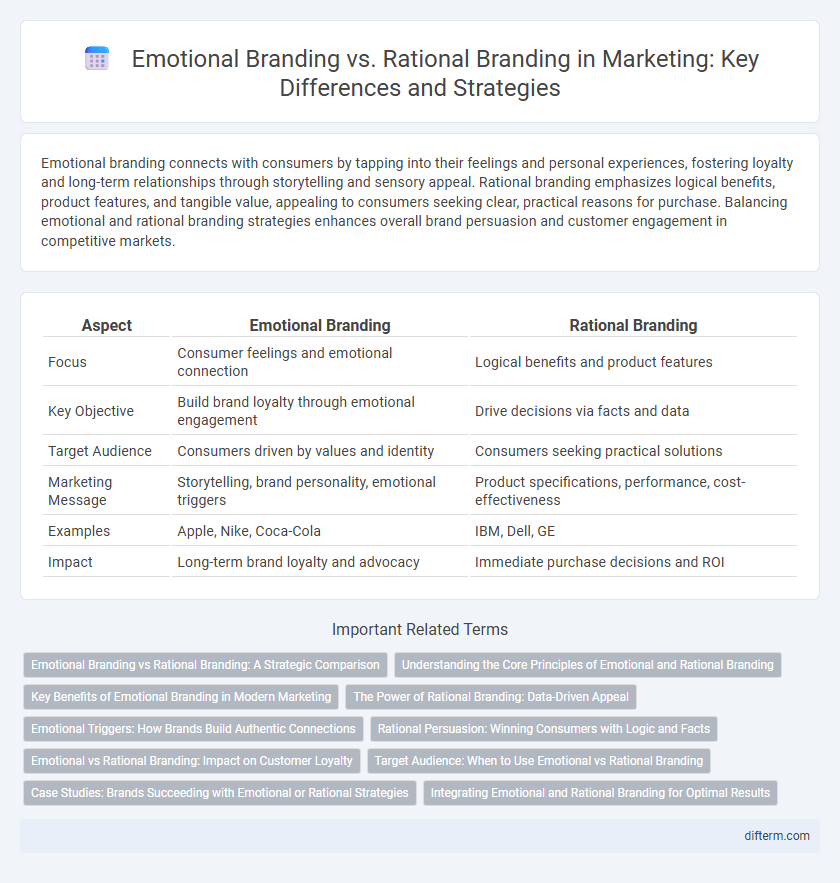Emotional branding connects with consumers by tapping into their feelings and personal experiences, fostering loyalty and long-term relationships through storytelling and sensory appeal. Rational branding emphasizes logical benefits, product features, and tangible value, appealing to consumers seeking clear, practical reasons for purchase. Balancing emotional and rational branding strategies enhances overall brand persuasion and customer engagement in competitive markets.
Table of Comparison
| Aspect | Emotional Branding | Rational Branding |
|---|---|---|
| Focus | Consumer feelings and emotional connection | Logical benefits and product features |
| Key Objective | Build brand loyalty through emotional engagement | Drive decisions via facts and data |
| Target Audience | Consumers driven by values and identity | Consumers seeking practical solutions |
| Marketing Message | Storytelling, brand personality, emotional triggers | Product specifications, performance, cost-effectiveness |
| Examples | Apple, Nike, Coca-Cola | IBM, Dell, GE |
| Impact | Long-term brand loyalty and advocacy | Immediate purchase decisions and ROI |
Emotional Branding vs Rational Branding: A Strategic Comparison
Emotional branding leverages feelings and personal connections to foster brand loyalty, enhancing customer engagement and long-term advocacy. Rational branding prioritizes logical appeals such as product features, quality, and value, targeting consumers' decision-making processes through factual information. Strategic marketing integrates emotional and rational branding to balance trust-building with persuasive messaging, optimizing brand impact and customer retention.
Understanding the Core Principles of Emotional and Rational Branding
Emotional branding taps into consumer feelings and personal connections, creating loyalty through shared values and storytelling that resonate on a deep psychological level. Rational branding emphasizes logical benefits, product features, and cost-effectiveness, appealing to consumers' decision-making processes based on reason and practical considerations. Understanding the core principles requires balancing emotional engagement with clear, factual communication to build a comprehensive brand strategy that influences both heart and mind.
Key Benefits of Emotional Branding in Modern Marketing
Emotional branding creates strong customer loyalty by forging deep psychological connections that go beyond product features, enhancing brand recall and preference. It drives higher customer engagement through compelling storytelling and authentic messaging, fostering trust and long-term relationships. By appealing to consumers' values and emotions, emotional branding differentiates products in saturated markets, leading to increased lifetime value and advocacy.
The Power of Rational Branding: Data-Driven Appeal
Rational branding leverages data-driven insights to create targeted marketing strategies that resonate with logical decision-making processes. By emphasizing product features, performance metrics, and tangible benefits, it appeals to consumers seeking value and reliability in their purchases. This approach builds trust and encourages informed choices, strengthening brand credibility through evidence-based communication.
Emotional Triggers: How Brands Build Authentic Connections
Emotional branding leverages triggers such as nostalgia, empathy, and trust to forge authentic connections that resonate deeply with consumers, enhancing brand loyalty and advocacy. By tapping into feelings like happiness, security, or belonging, brands create memorable experiences that transcend product features and price. This approach often leads to stronger customer engagement compared to rational branding, which emphasizes logic, facts, and functional benefits.
Rational Persuasion: Winning Consumers with Logic and Facts
Rational persuasion in marketing leverages logical arguments and factual evidence to influence consumer decisions by highlighting product features, benefits, and cost-effectiveness. Brands employing rational branding emphasize data-driven comparisons, performance metrics, and clear value propositions to build trust and credibility. This approach appeals to consumers seeking practical solutions and informed choices, ultimately driving purchase decisions through reason rather than emotion.
Emotional vs Rational Branding: Impact on Customer Loyalty
Emotional branding cultivates deep customer loyalty by forging personal connections through storytelling, sensory experiences, and brand personality, which resonate with consumers' values and feelings. Rational branding drives loyalty by emphasizing logical benefits such as product quality, features, and cost-effectiveness, appealing to customers' practical decision-making processes. Research indicates that emotional branding often leads to higher customer retention rates and stronger brand advocacy compared to purely rational approaches.
Target Audience: When to Use Emotional vs Rational Branding
Emotional branding resonates deeply with target audiences seeking connection, loyalty, and identity, often effective for lifestyle, luxury, or experience-driven products. Rational branding appeals to consumers prioritizing facts, features, and tangible benefits, commonly used in industries like technology, finance, and healthcare. Brands should assess their target audience's motivations and purchasing behavior to determine whether emotional storytelling or data-driven messaging will maximize engagement and conversion.
Case Studies: Brands Succeeding with Emotional or Rational Strategies
Case studies like Nike demonstrate success with emotional branding by creating powerful narratives that connect deeply with consumers' aspirations and values, driving loyalty and engagement. In contrast, brands like IBM leverage rational branding by emphasizing technology, performance, and reliability, appealing to logic-driven decision-making in B2B markets. These examples highlight how emotional branding excels in building consumer relationships through storytelling, while rational branding effectively targets customers seeking data-driven, functional benefits.
Integrating Emotional and Rational Branding for Optimal Results
Integrating emotional and rational branding enhances customer engagement by appealing to both feelings and logic, fostering deeper brand loyalty and trust. Emotional branding creates memorable experiences and emotional connections, while rational branding highlights product benefits and value proposition, addressing consumer needs and decision-making processes. Combining these strategies allows marketers to craft comprehensive campaigns that resonate on multiple levels, driving optimal results in brand awareness and conversion rates.
emotional branding vs rational branding Infographic

 difterm.com
difterm.com